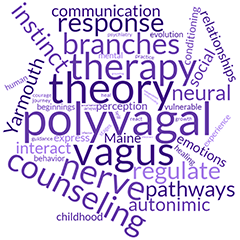The true sign of intelligence is not knowledge but imagination.
PolyVagal Theory
 “Between stimulus and response, there is a space. In that space is our power to choose our response. In that response lies our growth and freedom. “
“Between stimulus and response, there is a space. In that space is our power to choose our response. In that response lies our growth and freedom. “
—Viktor Frankl
I can help you widen this space and learn to respond to triggers rather react to them. I do this by using a type of emotion regulation based in the neuroscience of the Autonomic Nervous System (ANS) called Polyvagal Theory developed by Dr. Stephen Porges, PhD.
This approach helps us understand our response to danger and involves learning something about your own ANS. You might recall from biology or psychology class that the ANS runs our body’s fight, flight or freeze response. It functions below conscious thought which sometimes makes us like feel we have no control. And in some ways this is true, rightfully so. There was a poster years ago that said, “Watch out for the rolling ball; a child is sure to follow.” Have you had such an experience? A child’s toy rolls into the road in front of your car and you instinctively apply the brake? It’s our ANS that rushes into action below conscious thought to make sure we step on the brake. We probably feel shaken afterwards, but after a bit we return to the state we were in before it happened. That’s when our ANS feels like our friend. If we have a confrontation with our, partner, child, or boss we may feel differently if we react quickly to this perceived sense of danger.
The ANS is comprised of three parts: safe and social, fight or flight, and shutdown or freeze. We move back and forth between these states depending on cues of danger and safety, both external and internal. Some of us may live most of the time in one of these parts. That’s great if it’s spent in the safe and social part, but it can be problematic for our physical and mental health if it’s in one of the other two parts.
I can help you learn to befriend your ANS by doing some mapping exercises, then teach you skills to help you find that space between stimulus and response so that you can learn and grow into the life you want to live.
If this sounds interesting to you, read more about it in this article by my teacher and mentor, Deb Dana. LCSW.